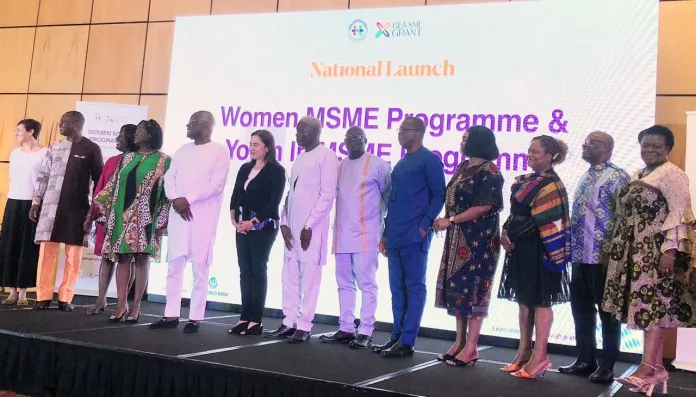
Boost For Women, Youth-Led MSMEs3 min read

The Ghana Enterprises Agency (GEA) has launched two new interventions aimed at positioning women and youth-led micro, small and medium enterprises (MSMEs) at the forefront of the country’s economic recovery efforts.
The interventions – dubbed ‘Women MSME’ and ‘Youth MSME’ – are the result of close collaborations between GEA, the Ministries of Trade and Industry and Finance and the World Bank. The programmes will be implemented under the Ghana Economic Transformation Project (GETP).
Over GH¢30million and about GH¢60million have been earmarked for the women and youth MSME programmes respectively.
Even though MSMEs account for 92 percent of all registered businesses in the country, and contribute roughly 70 percent of Ghana’s gross domestic product, data from the Office of Registrar of Companies show just 44 percent of these MSMEs are owned by women entrepreneurs’ vis-à-vis the sex ratio of 49 percent to 51 percent female to male population as of 2021.
Also, young people between the ages of 19-35 make up the largest population segment in the country – about 11.7million; making up 38.2 percent of the total population of almost 31 million people, hence the introduction of these women and youth-focused exclusive technical assistance and grant funding programmes as part of government’s initiatives to promote and accelerate investments in high-growth MSMEs with promising prospects of scaling-up to become job creators.
Transformative initiatives
The Minister of Trade and Industry, K.T. Hammond – who launched the programmes in Accra, described the initiatives as “worthy, timely and ultimately strategic and transformative”.
With such support, he said, the GEA with support from government and the ministry will successfully lead the creation of a significant pool of modern, globally competitive and sustainable high-growth MSMEs that drive and sustain economic growth and development.
“We are committed to continue leveraging funding and development assistance to address the challenges of access to finance,” he stated, noting that the launch is in line with the ministry’s efforts at achieving ‘development of SMEs’ – which is part of the ten-point pillars of government’s industrial transformation agenda.
The agenda seeks to give small- and medium-scale businesses the needed boost to survive and impact government’s objective of job creation.
Citing the 2021 Population and Housing Census – which suggests that the age structure of country’s population may be transitioning from one dominated by children (0-14 years) into a population dominated by young people aged between 15 and 35 years, Mr. Hammond said: “This reinforces the urgency needed to join forces with the private sector and development partners so as to fully implement Ghana’s MSME and Entrepreneurship Development Policy and enhance the creation of jobs for this population”.
He commended the GEA for taking up a commanding lead in implementing strategic projects and funding schemes for MSMEs nationwide, especially in respect of women and the youth.
“We expect GEA to continue its excellent performance in the use of digital platforms and provide comprehensive support through its extensive network of business development service providers. We also expect this to be done with the special duty of care necessary to safeguard long-term interests of the businesses,” he stated.
The future is women and youth
The Chief Executive Officer (CEO) of GEA, Kosi Yankey Ayeh, on her part said the newly launched programmes will redefine government’s focus toward women- and youth-led MSMEs, because “the future is women and the youth”.
“So it’s very important that we do a whole lot more to support female and youth-led MSMEs in Ghana…but not because we don’t see a high number of them apply for our interventions; the challenge we see is that they are applying for less amounts of money and the capacity to reach and exceed and move to the next level is being challenged. So, in order to be able to do more and do better – in partnership with the World Bank, the Ministries of Trade and Industry and Finance, we thought it best to develop new interventions that will transform these businesses,” she stated.





















